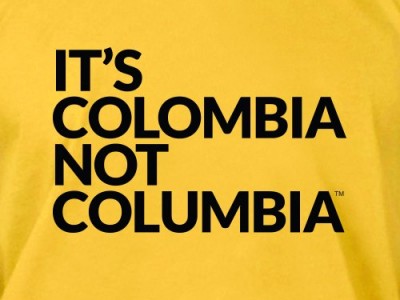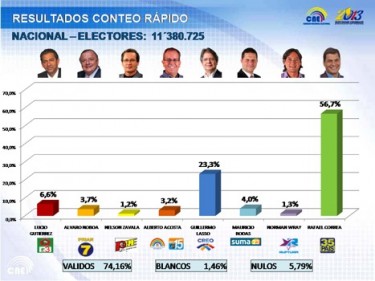Stories about Latin America from February, 2013
Christian Protests Target Puerto Rico's Rising LGBTQ Rights
In the past few weeks various key events have occurred with respect to LGBTQ rights, the most prominent of which may be a demonstration organized by conservative Christian groups called "Puerto Rico Rises Up" to protest against proposed amendments that would extend legal protection to same sex couples in cases of domestic violence.
Powerful Union Leader “La Maestra” Arrested in Mexico
The arrest of union leader Elba Esther Gordillo for money laundering has caused a stir in Mexico. "La Maestra" is already behind bars at the Santa Martha Acatitla Social Rehabilitation Center in the outskirts of Mexico City.
Latin America Turns to iPhone App to Take Hammerhead Sharks Off the Chopping Block
Countries across Latin America are on a mission to get hammerheads onto the Convention on International Trade in Endangered Species of Wild Fauna and Flora (Cites) list for protection. They’re armed with a new iPhone app that promises to make fin identification quick and easy. Listing the sharks would help fund financially strapped programs in Latin America and restrict global trade.
Online Course in Spanish on Election Coverage
The Knight Center for Journalism in the Americas is offering a Massive Open Online Course (MOOC) in Spanish on “How to Improve Electoral Coverage.” The course will be taught by...
Squatters Call Venezuela's Highrises Home
In Margarita Island, there’s Corocoro, an unfinished apartment block which was under the control of FOGADE (the State’s entity in charge of taking over assets from failed banks) until June...
Colombia: “Let's Revoke Congress”
Colombian netizens are using the the hashtag #revoquemoselCongreso [Let's Revoke Congress] to expose the reasons why the country's members of Congress should leave their jobs.
Why Are Tourists Not Wanted at French Carnival?
A video featuring a group of masked Carnival revelers in Dunkirk, France chanting "we don't like tourists" has some web users ruing the flood of visitors who come year after year unprepared for the festival's madness.
Costa Rica: Time of the Vanquished
In the post titled “Time of the vanquished” [es], the blog Furia raises profound reflections about what happens when quietness comes. It concludes its reflections by saying: “in order to...
Brazil: Cable Car Goes Up, Houses Come Down for World Cup
The construction of a cable car for tourists in preparation for the 2014 FIFA World Cup in the Morro da Providência favela in Rio de Janeiro is kicking residents out. Demolished houses are being traded for a stipend of 400 reais (200 US dollars), and many families have been unable find a place to live.
VIDEO: In Bolivia, Indigenous Women Draw Society's Short Straw
Marisol, an indigenous Bolivian woman, says that in her country "being an indigenous woman is the worst thing that can happen to you." Her testimony is part of a news report by Mario Munera which explores the lives of Bolivian women in the contexts of education, politics and sexist violence. The report "Women in Bolivia" was published in Periodismo Humano.
Is Mexico Really “Back in the Game”?
In his latest column, renowned New York Times columnist Thomas Friedman argues that Mexico “will become the more dominant economic power in the 21st century.” Twitter immediately reacted to his...
Brazil: Citizen Journalists Expose City's Unfinished Works
Project Amigos de Januária has shed light on the failure of a local Brazilian government, marred by a legacy of administrative wrongdoing and poor accountability, to complete public works projects on time.
Uruguay Has South America's Fastest Net
Not that long ago, I'd never thought I could report this, but here we are. According to Netindex, Uruguay is the country with the fastest average speed in Latin America,...
Football Fireworks Claim Minor and Media Ethics in Bolivia
Bolivian media used the Facebook image of a 14-year-old boy to cover his tragic death at an international football match where he was hit by celebratory fireworks in Oruro city. But was this move ethical, moral, or even legal?
Get it Right: “It's Colombia, NOT Columbia”
In an attempt to fix a common spelling error and improve the image of their country, four young Colombian professionals launched the social media campaign "It's Colombia, NOT Columbia." Despite its quick success, the campaign has not been free from criticism.
Panama: TV Nostalgia
With a nostalgic touch, the blog El Panameño reviews [es] some 70s and 80s TV series, and challenges readers to see if they can match the titles with the posters...
Cuban Yoani Sánchez's Arrival in Brazil Makes Noise
Acclaimed Cuban blogger Yoani Sánchez left Cuba this past Sunday for the first time since 2004. Sánchez will visit and speak at universities, NGOs and government forums in Europe, Latin America and the United States. While many voices around the world have expressed joy and excitement about Sánchez’s tour, responses have not all been positive.
Bolivia's President to Seek a Second (or Third?) Term
After Bolivia's ruling party announced that President Evo Morales will seek re-election in the next president contest scheduled for December 2014, debate ensued over whether his current term counts as his first or second, and whether the country's four-year-old constitution would allow him to run again.
Ecuador's Political Future After Correa's Reelection
On February 17 Rafael Correa was re-elected as the president of Ecuador. According to the quick count, the ruling party also obtained at least 96 of the 137 seats in the new National Assembly. Bloggers were quick to analyze the political future of Ecuador under a new Correa mandate and a new political force in the role of the opposition.
A Timeline of Colombian Peace Talks
Adam Isacson has been updating a timeline on the peace talks between the Colombian government and the FARC (Revolutionary Armed Forces of Colombia). The timeline includes relevant links with more...
Yoani Sánchez Divides Opinions on a Visit to Brazil
Cuban blogger Yoani Sánchez was received in Brazil by pro-Cuban government protesters, who accuse her of receiving money from the United States' government and of being a CIA agent. The ones that support the dissident's actions accuse the Brazilian government of collaborating with the Cuban government's repression.















